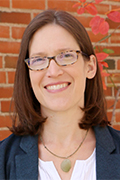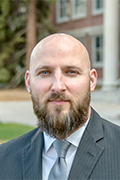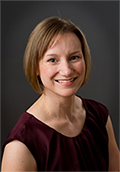


Select one of the options below:
Accelerate your career as a music therapy clinician or educator. Advance your scholarship and reach your professional goals.
Learn from faculty with a range of backgrounds, areas of focus, and approaches in therapy. Faculty are connected to the community and collaborate with colleagues in human development, music education, early childhood, psychology, gerontology, communication studies, and occupational therapy.
Small class sizes allow for maximum participation and intimate discussions with fellow students and faculty.
Online coursework provides flexibility for working professionals. Earn your Ph.D. from a respected, regionally accredited public research university. Balance your academic studies with your career and personal obligations.
In this episode, we talk with two faculty members in CSU’s Music Therapy department: Dr. Blythe LaGasse and Dr. Jess Rushing. We learn about the healing power of music, why music therapy works, and how it fits into a holistic healthcare system.
This unique Ph.D. program can help you gain the knowledge to take the next step in your career. After successful completion of the program, you may consider job opportunities such as:
The Ph.D. in Music Therapy is comprised of 72 credits, of which 30 credits may be accepted from a prior master's degree.

Dr. Blythe LaGasse is coordinator and associate professor of music therapy at Colorado State University. She is director of the online program in music therapy. She has been a music therapist specializing in working with children with autism spectrum disorder for over sixteen years and is an active clinician.
Dr. LaGasse was a faculty trainer for the Neurologic Music Therapy (NMT) Academy for eight years. She holds a certificate of proficiency in DIR/Floortime from the Interdisciplinary Council on Development and Learning. Dr. LaGasse has publications in Frontiers in Integrative Neuroscience, the Journal of Music Therapy, Music Therapy Perspectives, and Music and Medicine. She was the 2016 recipient of the American Music Therapy Association Arthur Flagler Fultz Research grant award and in 2016 she and co-investigator Dr. Erik Johnson were awarded the GRAMMY Foundation grant award.
Dr. LaGasse was the 2015 recipient of the American Music Therapy Association Research Award. She was the 2016-2017 recipient of the College of Liberal Arts Excellence in Teaching Award. She was the Fall 2017 recipient of the CSU Online Innovative Educator Award.

Dr. Andrew Knight holds a bachelor's degree in percussion performance, with a jazz emphasis, from UW-La Crosse, a music therapy equivalency and master's degree from the University of Minnesota, and a Ph.D. in educational foundations and research from the University of North Dakota (UND).
Dr. Knight has research interests in substance use disorders in adults and early childhood social/emotional developmental issues. He directs the Parkinson's Disease vocal exercise group in collaboration with the Parkinson's Support Group in Larimer County and is a Music Together Within Therapy™ provider. His research has been published in the Journal of Music Therapy and Music Therapy Perspectives, among other journals, and serves as Associate Editor for Book Reviews for JMT. He is the 2017-2019 president of the Midwestern Region (MWR) of the American Music Therapy Association (AMTA), on the AMTA Assembly of Delegates, and has won the MWR and AMTA Service Awards. Along with Dr. Blythe LaGasse and Dr. Alicia Clair, he is a co-editor of the 2018 Introduction to Music Therapy textbook published by AMTA.

Dr. Wilhelm holds degrees in music therapy from Colorado State University (BM) and the University of Iowa (MA, Ph.D.) and is a Fellow in Neurologic Music Therapy (NMT). A board-certified music therapist since 2007, Dr. Wilhelm has worked with both children and adults in a variety of community, educational, rehabilitative, and medical settings. Her current research areas and interests include music therapy applications for aging adults with hearing loss; students' self-care practices; and music therapy applications for family caregivers.

Dr. Rushing has worked clinically with all ages from premature infants to end-of-life with considerable experience in medical, private practice, and mental health. Rushing’s research interests include music therapy in acute post-stroke care, music therapy supervision using Self-Determination Theory, and community engagement. In addition to teaching and research, she has previously owned a private practice and supervised the UofL Music Therapy Clinic. She is a Fellow of the National Institute of Infant and Child Medical Music Therapy and has completed training in Neurologic Music Therapy. Dr. Rushing is currently the chair elect of the American Congress of Rehabilitation Medicine (ACRM) Arts and Neuroscience Networking Group. She enjoys continuing to be an active clinician.
Students may be admitted for the fall semester only.
| Fall semester | February 15 |
Start your application online and upload materials directly into the online system. You can save your progress and return any time.
Apply NowFor full consideration for a Fall semester start, please submit your application by February 15. Applications beyond this date will be accepted and considered on an individual basis.
Admission requirements reflect the minimum standards an applicant must meet. Achievement above the minimum standards will increase the competitiveness of your application. If you have any questions about the application requirements and process, please contact Blythe LaGasse, Ph.D., MT-BC, Program Coordinator.
Note on Applicant Interviews: All finalists for the Ph.D. program will undergo an interview with the music therapy faculty. The applicant will need to demonstrate functional music skills during this interview.
Admission requirements:
Note that meeting the minimum department standards does not ensure admission to the program. Admission to Colorado State University graduate programs is based on a number of factors, including prior academic and professional experience and the personal statement.
Applicants will be required to submit the following information. Incomplete applications will not be considered.
The statement should include the following points:
Please include at least three years successful full-time experience, or its equivalent, as a professional music therapist.
Provide a video clip of no more than seven minutes showing a therapeutic music experience. This does not need to include a client.
Provide a one-page explanation that includes a client description (i.e., describe an individual with whom you would use this technique/protocol), goal/objective, explanation of choice in the therapeutic music experience, and what you would do next in the treatment process.
Applicants are required to identify two references who will be requested to provide information electronically. References should be able to speak to your current ability to complete doctoral work and research.
Complete the online graduate application form and pay the nonrefundable application processing fee (payable online). As soon as you have completed the required information, please submit your application. Your application will not be reviewed until it is complete and all required materials have been received.
CSU's Graduate School offers several application fee waiver opportunities. Visit their website to determine if you are eligible for a waiver.
Request one official transcript of all collegiate work completed from all institutions attended. Transcripts from Colorado State University are not required. Transcripts must be received directly from the originating institution to be considered official.
Please Note: Students may be unconditionally admitted and registered in their first semester of courses with an unofficial transcript. Official transcripts must be submitted, prior to or during your first semester, before you can register for your second semester of graduate work. Failure to meet this condition will result in your dismissal from the Graduate School.
Electronic (preferred): Digital Transcripts must be submitted by the originating institution using a secure service such as parchment, eScrip-Safe, the National Student Clearinghouse, or e-Quals. Transcripts received via emails are considered unofficial. Use institution code 4075 for Colorado State University or gradadmissions@colostate.edu if the secure service requires an email address.
Mail (if necessary) Graduate Admissions Colorado State University – Office of Admissions 1062 Campus Delivery Fort Collins, CO 80523-1062
View your application status at any time to ensure your application checklist is complete or to check on updates.
Once your complete application, including supporting materials, is received, the department admission committee will review your application and notify you of their decision.
Proof of English language proficiency is required for applicants from countries or United States territories where there are official languages other than (or in addition to) English. This includes the U.S. territories of American Samoa, Guam, the Northern Mariana Islands, and Puerto Rico.